Ed Gorman's Blog
July 1, 2016
Catching up with Max Allan Collins

1. Tell us about your current novel.
There are a couple of things that will become available soon. One is the complete version of the ROAD TO PERDITION novel. It was written in 2002 to accompany the release of the film, but DreamWorks licensing made me do a drastic cutting/rewrite, eliminating 30,000 words and any dialogue or action that wasn't included in the book. I am very grateful to Brash Booksfor negotiating with DreamWorks for the real, complete novel to finally be published.
About the same time, Hard Case Crime will be bringing out QUARRY IN THE BLACK, obviously a new Quarry novel with what I think or hope is an interesting setting -- George McGovern's presidential campaign and a black leader in St. Louis who is supporting that ticket with public appearances. If you ever wanted to see how Quarry would behave at a Ku Klux Klan meeting, now is your chance.
And Otto Penzler is bringing out A LONG TIME DEAD, collecting eight Mike Hammer short stories that I developed from Spillane fragments. That's exciting in part because there's never been a Hammer short story collection before.
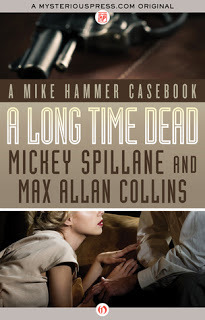
2. Can you give a sense of what you're working on now?
I just finished a Mike Hammer novel, THE WILL TO KILL, working from a few chapters in Mickey Spillane's files. It's very unusual for a Hammer, because the mystery is right out of Agatha Christie, with greedy children fighting over the proceeds of a murdered patriarch's estate.
Not too long before that, I did my pass on the new Barbara Allan mystery, ANTIQUES FRAME, co-written with my wife Barb. That was my first project after open-heart surgery and a minor stroke, and it was very gratifying to be able to get back up on the horse and ride so quickly. just weeks after the surgery.
Next up is EXECUTIVE ORDER, the third Reeder and Rogers political thriller, in collaboration with Matt Clemens.
3. What is the greatest pleasure of a writing career?
The greatest pleasure of a writing career is having one. The notion that I could ever hold down a normal job is highly suspect.
4. What is the greatest DISpleasure?
I don't know if there's a dis-pleasure for me. I really love this life. The things that frustrate me are minor in the bigger picture. For example, I despise having copy editors rewrite me, and have spent way too much time in my life putting various Humpty Dumptys back together. It's always disappointing when a novel is critically ignored or particularly when the public ignores it. When a publisher drops a series, it can be crushing—I had to wait ten years before I felt I could re-launch Nathan Heller, and a lot of time was lost there.
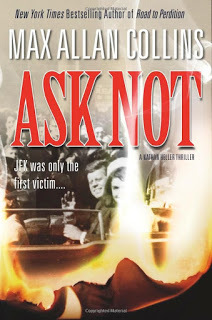
5. If you have one piece of advice for the publishing world, what is it?
For the publishing world itself? Don't judge an author by how well his or her last book sold. Judge each book on its own merits, and that includes proposed novels from authors whose professionalism isn't in question.
6. Are there two or three forgotten mystery writers you'd like to see in print again?
So many of my favorites are back in print again in the POD and e-book fashion. But it would be nice to see Horace McCoy, Mike Roscoe and Roy Huggins out there in a more major way. I was pleased to see Ennis Williefinally get some attention, but unfortunately it's faded somewhat.
7. Tell us about selling your first novel. Most writers never forget that moment.
Mine is easy to remember. I got the letter (my agent at the time never called me) on Dec. 24, 1971—BAIT MONEY, the first Nolan novel, had sold on Christmas Eve! When I told Donald E. Westlake about it—he'd been a mentor to me—he said, "Sometimes God behaves like O. Henry, and there's nothing you can do about it."
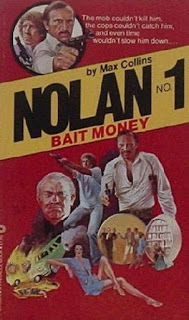
Published on July 01, 2016 15:08
June 11, 2016
Book Review: ZIGZAG by Bill Pronzini
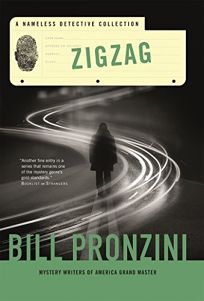
ZIGZAG You can’t fake it, the kind of mastery Bill Pronzini shows in all his writing, whatever the genre, whatever the length. And his years of writing Grand Master-level material inform every single line and scene in this new collection. Included are two new novellas and two short stories well worth reprinting. The novellas are equally strong. “Zigzag” demonstrates that the simplest of mishaps—a minor accident investigation—can take you places you may not want to go. Nameless really earns his private eye money on this one. The melancholy truths of “Grapplin’” shows us the emotional power that underpins so much of Pronzini’s most celebrated work over the years even though it also manages to be filled with kind and gentle truths. On this one Nameless shares the spotlight with his new business partner Tamara. The two short stories are strong and fresh. They illustrate that no matter what form Pronzini uses, he makes it his own. My favorite here is “Revenant.” Pronzini has always done well by the supernatural even though he is certainly a skeptic. What we have a here is a spin on road rage. A strange man named Antanas Vok piled his car into an embankment, blaming Peter Erskine and his wife Marian for the crash. Witnesses say otherwise. Vok’s wife dies in the accident and Vok stands there screaming threats at the Erskines. He will make sure that they will be dead, too. A year later, Vok is still stalking them and they are scared. The police have been no help. Lately the harassment has taken a turn into the occult. The black host is the Satanic version of the Roman Catholic host. When you touch it the residue sticks to both your fingers and your clothes. Vok has sent them a black host to show them his power over them. Supernatural power? Erskine doesn’t believe it and neither does Nameless. Marian Erskine can’t decide what she believes. Oh, and there’s one other small problem. How can Vok be sending them black hosts when he’s been dead for some time? Nameless is surprised when he meets Marian who spends a good deal of her time in a gazebo-like creation that could only be found in the type of posh gated community the Erskines live in. Marian turns out to be substantially older than her husband and very frail. Namesless notes that in today’s one percent culture it’s all right for older women to have trophy husbands. Peter isn’t exactly a pretty boy but close. Marian’s obvious drinking problem adds just one more confusing psychological layer to the meeting. The Erskines beg Nameless to take the case and ultimately he chooses to because the fee they offer him is so good and he’s just so damned curious about what’s really going on here. This is the way to tell a supernatural story—sardonically. Pronzini show us that no matter how bizarre the world of the supernatural is, the human world is always stranger. A five star collection. Perfect for a wide range of readers.
Published on June 11, 2016 16:51
May 29, 2016
Now Available: Branded - Ed Gorman
Now Available: Branded - Ed Gorman
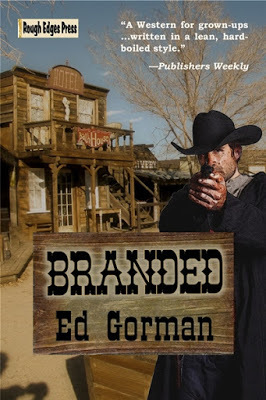
Young Andy Malloy is surrounded by tragedy and trouble. His stepmother is dead. His father, accused of her murder, is on the run from a posse led by a brutal sheriff with demons of his own. Andy’s investigation into the crime is about to put him in deadly danger. And the truth, not to mention Andy’s own life, may rest in the hands of a pathetic town drunk and a freckle-faced redhead . . .
BRANDED is a classic novel by the master of Western noir, Ed Gorman. Filled with compelling characters, breathtaking suspense, and stunning plot twists, it’s a yarn guaranteed to please Western and mystery readers and a novel not soon to be forgotten.
(This is one of Ed's best books. If you haven't read it, do yourself a favor and grab it.)
Posted by James Reasoner at 1:58 PM 1 comment:

Young Andy Malloy is surrounded by tragedy and trouble. His stepmother is dead. His father, accused of her murder, is on the run from a posse led by a brutal sheriff with demons of his own. Andy’s investigation into the crime is about to put him in deadly danger. And the truth, not to mention Andy’s own life, may rest in the hands of a pathetic town drunk and a freckle-faced redhead . . .
BRANDED is a classic novel by the master of Western noir, Ed Gorman. Filled with compelling characters, breathtaking suspense, and stunning plot twists, it’s a yarn guaranteed to please Western and mystery readers and a novel not soon to be forgotten.
(This is one of Ed's best books. If you haven't read it, do yourself a favor and grab it.)
Posted by James Reasoner at 1:58 PM 1 comment:

Published on May 29, 2016 13:42
May 26, 2016
BETTER ED - Max Allan Collins and Friends
May 24th, 2016 by Max Allan Collins
Normally I would just provide a link, but this BETTER DEAD review from Ed Gorman’s blog is so smart and trenchant (not a word you hear much these days), I just had to share it with you here. By way of full disclosure, Ed and I are friends, but we are also genuine fans of each other’s work.
BETTER DEAD
In 1983, Max Allan Collins created a brand new sub-genre, something very few writers have ever done. In TRUE DETECTIVE, his first Nathan Heller novel, he wedded the street-wise private detective novel with the historical novel.
The advantages to this approach were enormous. The big blockbuster historical novels were all too often stagey and wooden. Heller not only brought a sense of humor to the dance, he treated the historical figures he dealt with as human beings who farted, told dirty jokes and had the kind of mundane personal problems the big blockbusters never dealt with. In other words, he brought reality to the table.
In BETTER DEAD Heller is hired by Senator Joseph McCarthy to prove that all the victims Tail Gunner Joe is pursuing are actually “Commies.” His particular interest is Julius and Ethel Rosenberg, who sit in prison awaiting their execution. This is just how I imagined McCarthy, a drunken, ignorant Mick rummy bent on achieving massive power. He is assisted in this by none other than Roy Cohn, a vile and treacherous figure who just happened to be (half a decade later) one of Donald Trump’s mentors.
But Heller also signs on to help an ailing Dashiell Hammett find evidence that the Rosenbergs have been set up and are innocent.
Collins recreates the Zeitgeist of the era very well. Yes, there were a lot of Communist sympathizers back then, mostly older men and women, intellectuals often, who saw the suffering during the Depression and thought—mistakenly—that Communism was the solution. (I started college in 1962 and took a history class from an elderly professor who was still a Stalinist, despite the fact that we now knew that Uncle Joe Stalin had slaughtered millions and millions of his own people.)
But these weren’t “Communist agents,” just disillusioned intellectuals (the Coen Bros. wittily address this in their latest film “Hail Caesar”).
Collins’ sociological eye never fails. Here’s a description I’ve now read three or four times just because I enjoy it so much. Heller is in the Bohemian heart of Greenwich Village.
“The clientele this time of time of night was mostly drinking coffee, and a good number were drunk, some extravagantly so as artists and poets and musicians sang their own praises and bemoaned the shortcomings of their lessers. These were self-defined outcasts, their attire at once striking and shabby, drab and outlandish.”
Bravado writing on every single page.
Max Allan Collins not only created a new sub-genre—he is its undisputed master.* * *Speaking of BETTER DEAD, we are sitting at five reviews on Amazon. We sure could use some more (same for THE BIG SHOWDOWNand MURDER NEVER KNOCKS). ANTIQUES FATE is doing better at twelve reviews.
For those who have not written reviews at Amazon and/or Barnes & Noble before, you don’t have to be Anthony Boucher – just a couple of lines expressing your opinion is all that’s necessary. But more is welcome.
* * *
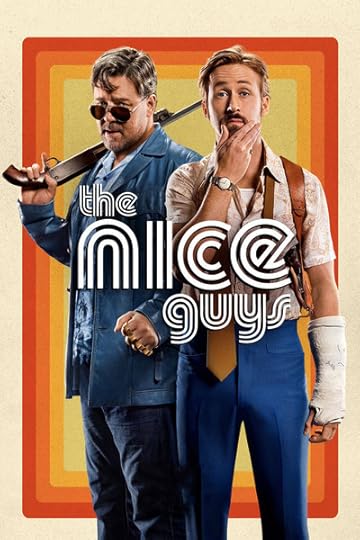
Here’s a movie you need to go to: THE NICE GUYS.
If you, like me, consider Shane Black’s KISS KISS BANG BANG (2005) the best private eye movie of recent years, you will be a porker in excrement at this one. Set in 1977, the script co-written by Black nails the era to perfection, paving the way for outstanding art direction.
But you won’t go home whistling the sets. The plot, which has to do with the murder of a porn star, is a twisty thing where the detectives mostly stumble onto the clues, but you’ll only be amused. The dialogue has a witty, naturalistic bounce that stands apart from the story, reminiscent of my favorite TV show, ARCHER. And it’s rare that a crime film can be this funny and yet be so tough. There’s a lot of Spillane in this one, particularly by way of Russell Crowe, heavy-set and menacing and rather sweet.
Crowe and his co-star Ryan Gosling are the surprises here. I thought Gosling was an empty pretty boy until I saw him on SNL a while back and he was funnier than the cast. Here he is hilarious without shortchanging the character. I knew I liked this movie, but I loved it when Gosling found a corpse and did a tribute to Lou Costello by way of his “Hey Abbott!”-type reaction.
Warning: it contains lots of nudity and blood splattery violence, and by “warning” I mean “recommendation.”
* * *Here’s a really nice and very smart review of MURDER NEVER KNOCKS.
Check out this terrific review of the Ms. Tree novel, DEADLY BELOVED.
Finally, you may get a kick out of this look at the Bradbury Building, home of Nate Heller’s LA office. I participate in the comments section.
M.A.C.
Tags: Better Dead, Mike Hammer, Murder Never Knocks, Nate Heller, Nathan Heller, Reviews, Spillane
Posted in Message from M.A.C. | 5 Comments »
Published on May 26, 2016 08:09
May 24, 2016
Stark House Mystery Classics - Ed Gorman
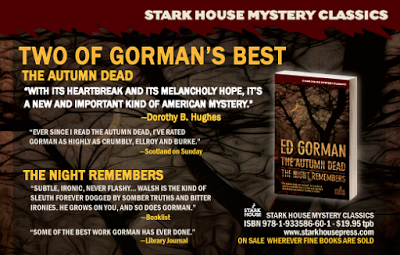
Pick up a copy of Stark House's beautiful The Autumn Dead / The Night Remembers volume from Amazon today!
Published on May 24, 2016 10:28
May 23, 2016
Forgotten Books: The Plastic Nightmare by Richard Neely
The Plastic Nightmare
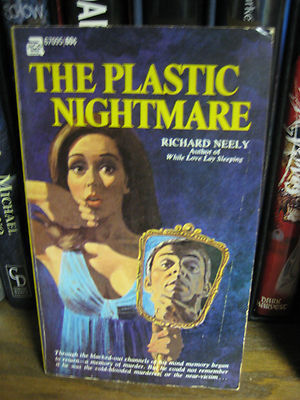
I've written here before about Richard Neely. He wrote non-series crime novels that pretty much covered the entire range of dark suspense. I mentioned that in the best of them the weapon of choice is not poison, bullets or garrote. He always prefered sexual betrayl.
Plastic is a good example. Using amnesia as the central device Dan Mariotte must reconstruct his life. Learning that the beautiful woman at his bedside all these months in the hospital--his wife--may have tried to kill him in a car accident is only the first of many surprises shared by Mariotte and the reader alike.
What gives the novel grit is Neely's take on the privileged class. He frequently wrote about very successful men (he was a very successful adverts man himself) and their women. The time was the Seventies. Private clubs, privte planes, private lives. But for all the sparkle of their lives there was in Neely's people a despair that could only be assauged (briefly) by sex. Preferably illicit sex. Betrayl sex. Men betrayed women and women betrayed men. It was Jackie Collins only for real.
Plastic is a snapshot of a certain period, the Seventies when the Fortune 500 dudes wore sideburns and faux hippie clothes and flashed the peace sign almost as often as they flashed their American Express Gold cards. Johny Carson hipsters. The counter culture co-opted by the pigs.
The end is a stunner, which is why I can say little about the plot. Neely knew what he was doing and I'm glad to see his book back in print. Watching Neeely work was always a pleasure.
Published on May 23, 2016 12:10
May 20, 2016
Review of my book LAWLESS
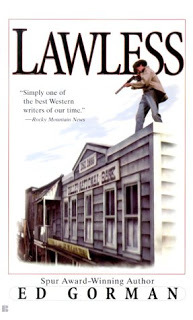
At Thomas McNulty's blog, Dispatches From the Last Outlaw, he writes a very kind review of my novel LAWLESS. Here's a sample:
'I am long overdue in discussing an Ed Gorman novel on this blog. There was a time when he had books coming out from Leisure and Berkley and I bought whatever I could afford. If any of you are ever fortunate to meet my wife, she enjoys telling a story about giving me “lunch money” when we were first married (over thirty years ago) and then discovering I wasn’t eating lunch. You’ve already guessed what I did with the money. That’s right – the paperbacks piled up. They continue to pile up. Gorman is one of my favorites. Lawless dates from 2000, published by Berkley, a tough western. Gorman writes with an economy of style that still fully realizes the scenes, dialogue and characterization.'
Read the rest of the review here. Amazon has a few used copies available.
Published on May 20, 2016 14:49
May 19, 2016
Review--BETTER DEAD by Max Allan Collins
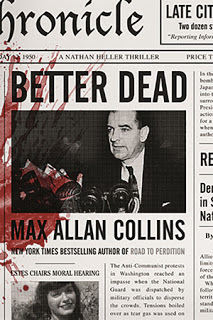
BETTER DEAD
In 1983, Max Allan Collins created a brand new sub-genre, something very few writers have ever done. In TRUE DETECTIVE, his first Nathan Heller novel, he wedded the street-wise private detective novel with the historical novel. The advantages to this approach were enormous. The big blockbuster historical novels were all too often stagey and wooden. Heller not only brought a sense of humor to the dance, he treated the historical figures he dealt with as human beings who farted, told dirty jokes and had the kind of mundane personal problems the big blockbusters never dealt with. In other words, he brought reality to the table. In BETTER DEAD Heller is hired by Senator Joseph McCarthy to prove that all the victims Tail Gunner Joe is pursuing are actually “Commies.” His particular interest is Julius and Ethel Rosenberg, who sit in prisons awaiting their execution. This is just how I imagined McCarthy, a drunken, ignorant Mick rummy bent on achieving massive power. He is assisted in this by none other than Roy Cohn, a vile and treacherous figure who just happened to be (half a decade later) one of Donald Trump’s mentors. But Heller also signs on to help an ailing Dashiell Hammett find evidence that the Rosenbergs have been set up and are innocent. Collins recreates the zeitgeist of the era very well. Yes, there were a lot of Communist sympathizers back then, mostly older men and women, intellectuals often, who saw the suffering during the Depression and thought—mistakenly—that Communism was the solution. (I started college in 1962 and took a history class from an elderly professor who was still a Stalinist, despite the fact that we now knew that Uncle Joe Stalin had slaughtered millions and millions of his own people.) But these weren’t “Communist agents,” just disillusioned intellectuals (The Coen Bros. wittily address this in their latest film “Hail Caesar”). Collins’ sociological eye never fails. Here’s a description I’ve now read three or four times just because I enjoy it so much. Heller is in the Bohemian heart of Greenwich Village. “The clientele this time of time of night was mostly drinking coffee, and a good number were drunk, some extravagantly so as artists and poets and musicians sang their own praises and bemoaned the shortcomings of their lessers. These were self-defined outcasts, their attire at once striking and shabby, drab and outlandish.” Bravado writing on every single page. Max Allan Collins not only created a new sub-genre--he is its undisputed master.
Published on May 19, 2016 06:14
May 17, 2016
Lawrence Block on Four Lives at the Crossroads
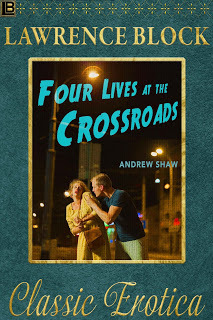
It seems only appropriate that I write something about FOUR LIVES AT THE CROSSROADS for Ed Gorman. He’s in part responsible for my decision to foist it upon all of y’all.
Bill Hamling’s operation (soft-core erotica while-u-wait) published the book as a Midnight Reader in 1962, so I must have written it sometime that year or the year before. (Manuscripts did not spend much time incubating in Evanston, Illinois. The fledglings lingered only long enough to be outfitted with a cover and title before being nudged out of the nest and into the world.)
This one flew off as Crossroads of Lust, which may or may not have been the title I hung on it. (Lust was so much a Hamling catchword that I’ve wondered if he ever made the effort to trademark it. I turned in one novel with the anagrammatically appealing title of Lust Slut, but someone in Evanston changed it to something else. And, after an all-night poker game had somehow failed to produce a viable collaborative novel, we who had written it referred to the resultant mess as Lust Fuck.)
But I digress…and probably not for the last time. That was this book’s title, Crossroads of Lust.As for its cover, it had nothing much to do with the book, and showed a young woman on her knees, with her hindquarters elevated. (We’ve been using the original cover art on our reissues of the Collection of Classic Erotica titles, but drew the line here; my Goddess of Design and Production said it cried out for the caption, “Doctor, I’m ready for my enema!”)
Anyway, off it went, Crossroads of Lust, launched into the world, and set to waste its fragrance on the desert air. By the time it appeared on shelves wherever bad books were sold, I’d probably written three or four others. I was at the time doing a book a month for Bill Hamling (even as a ghostwriter of mine was doing another under my Andrew Shaw name), and I didn’t spend a lot of time thinking about my manuscripts once they were out of the house. I was also writing other books, more ambitious work in the more demanding world of crime fiction, and those were the ones I thought about. The Andrew Shaw books took up space in my head only during the time I spent writing them.
Now Crossroads of Lust was in fact a little of both, its plot centered upon the armed robbery of an armored car, the doublecross that ensues, and the two star-crossed lovers racing to the Mexican border.
This wasn’t the first time Andrew Shaw had straddled genre lines. Early on, I started writing a book with a counterfeiting background, with the hope it would wind up as a Gold Medal crime novel. Five or six chapters in I lost confidence in it, felt it was missing the mark, and sexed it up enough to make it that month’s entry for Nightstand. I don’t know what I called it, but the boys in Illinois called it $20 Lust—there’s that word again—and I forgot about it.
But others remembered. Somehow the book came to the attention of both Ed Gorman and Bill Schafer, both of whom thought far more highly of it than did its author. They urged me to bring the book out again, and that was about the last thing I wanted to hear. I went through an enduring phase when I maintained the sort of non-recognition policy toward my pseudonymous early work as did United States for so long toward Mainland China, but with what struck me as better prospects for long-term success; China wasn’t going away, but Andrew Shaw’s work, printed on non-acid-free paper, very well might.
God speed the acid, said I.
It took a while, but eventually Ed and Bill got through to me, and lit a fire under Ego and Avarice, the matched steeds that haul my chariot. Bill’s Subterranean Press published the book, now yclept Cinderella Sims, in hardcover trade and limited editions. When the eRevolution broke out, I brought it out as an ebook via Open Road, and when my deal with that firm ran its course, I published it myself as both an ebook and a paperback, including it in my Classic Crime Library.
Meanwhile, my agent sold it in France, where they published it purely and simply as a crime novel, and where it did quite well. I dunno, maybe something was gained in translation.
Never mind. Over the years, Charles Ardai of Hard Case Crime was mining my store of early books, rescuing titles like A Diet of Treacle and Lucky at Cards and Borderline from the oblivion I’d always thought they deserved. I entered into the spirit of things and suggested a few others as Hard Case candidates, and Crossroads was one of them. Charles read it, weighed its merits against its deficiencies, and after due consideration decided against it. Part of his problem with the book was that he felt it was misogynistic, and perhaps it is, or at least several of its characters are.
A few months ago, pleased by the reception which greeted the 16 titles in my Classic Crime Library, I decided what the world needed was a Collection of Classic Erotica—i.e., the better examples of my work as Sheldon Lord and Andrew Shaw. Encouraged by the example of my friend Robert Silverberg, whose view on the subject struck me as far more honest and balanced than my own, I decided it was time not only to recognize Red China but to establish a profitable trade deal. (And to help keep the record straight in the bargain; there are many books out there bearing my pen names that were in fact written by other hands than mine, and republishing my own work is a way of granting it an imprimatur and establishing my personal authorship.)
So I took another look at Crossroads of Lust. And pondered where to include it—Classic Crime Library or Collection of Classic Erotica? Unlike $20 Lust/Cinderella Sims, it didn’t start out trying to be a crime novel. It was from the first page destined to be that month’s effort for Evanston, and that it had a crime plot was essentially coincidental. Andrew Shaw’s books, you should understand, benefited from belonging to an extremely forgiving genre. They had to be long enough, and they had to have a sex scene in every chapter, and they had to be written in some form of American English. Aside from that, they could be whatever they wanted to be, and might include whatever fermented in the author’s psyche and came out through his typewriter.
Did it occur to me, while I was writing Crossroads, that I might better steer it in an unsullied crime fiction direction, with a goal of publishing it with Gold Medal or someone similar? I’m fairly certain I never entertained such a thought. I wanted merely to be done with it and move on to whatever came next.
And now, all those years later, I began reading the book. I was surprised to note that I’d dedicated it—to the woman who’d run the Fourth Street Grill in Newport, Kentucky, an operation described quite faithfully in Crossroads. (You walked into a room with a lunch counter along the wall. “The counter’s closed, boys,” Madge would announce. “Would you like to go upstairs and see a girl?” I went there a couple of times—Newport was across the Ohio River from Cincinnati, which in turn was an hour’s drive from Yellow Springs, where I went to school—and I never got a sandwich or a cup of coffee, but I did go upstairs. I wish I’d thought to get a receipt, that I might write off such visits as tax-deductible research.)
I’ve digressed again, haven’t I? Never mind. I read the book, and saw why the Sage of Cedar Rapids had lobbied for its republication, and saw too why Charles Ardai had decided against it. But maybe a little editing would help.
If nothing else, I could undo some assistance I’d received from someone in Evanston. The epithet of choice throughout the book was louse, and somehow it didn’t ring true. We can stand it when James Cagney snarls “You dirty rat!” when what he would have said was more along the lines of “You fucking cocksucker!”—but he had the Breen office to contend with, and while Nightstand may have avoided all those words George Carlin couldn’t say on TV, I would think something like, say, bastard might do the job better than louse.
So I pruned here and tweaked there and rewrote a few terrible sentences, some of which I may have had the bad judgment to write some 45 years ago. And I began to suspect that what I was doing was putting lipstick on a pig.
Because the book was an erotic quickie at heart, and my efforts wouldn’t be enough to change that. Nor did I see much point in yanking the armored car holdup out of the book and writing a new book around it. It was what it was, and people would enjoy it or not, and if it didn’t really qualify for a slot in the Classic Crime Library, it could certainly hold its own in the Collection of Classic Erotica, where the crime element would only enhance it.
Having reached this conclusion, I went on applying Lady Danger to those porcine lips, probably giving the process more time than it needed. And the Goddess and I decided against gracing the result with its original cover. The Sheldon Lord books for Midwood were blessed with wonderful cover art, more often than not the work of the remarkable Paul Rader; Hamling’s books were less well served, and while Harold W. McCauley provided a superb cover painting for Campus Tramp, as time passed the covers got progressively shorter shrift. With all that lipstick, well, Crossroads deserved a better cover.
And a better title. Four Lives at the Crossroads struck me as an improvement, and I cobbled up a cover to fit, and the Goddess took a look at what I’d done and improved it hugely.
And that’s the story, Maurie—as a young fellow named TJ would tell you. The ebook’s available exclusively for Kindle, while the paperback should be on sale in a matter of weeks—at the CreateSpace store, from Amazon, and through other online booksellers as well.
Ed here: You can pick up the very entertaining Four Lives at the Crossroads by following the link. Visit the Lawrence Block website for more information.
Published on May 17, 2016 08:28
May 16, 2016
SHADOW GAMES review at Gravetapping
Ben Boulden at Gravetapping has a great review of the new edition of my novel Shadow Games. Here's a small taste: "I have a particular fondness for Shadow Games. It is not only a terrific novel, but it was my introduction to the work of Ed Gorman. The year was 2000. I made a habit of studying and writing in a library not far from where I worked as a pizza delivery driver; a job I won’t recommend, but a job that treated me well just the same. My usual table was tucked at the back of the fiction stacks. I sat, my back to the wall, facing a bookshelf packed with the latest genre titles making study nearly impossible since the stories beckoned me.
"There was one title that, day after day, caught my attention. It was a mass market paperback, black background with orange-red print and the large white Leisure Books logo—a publisher I miss badly—at the top of its spine. Its title, Shadow Games. When I finally relented and read Shadow Games, sitting right there in the library, its tale of Hollywood ambition, perversion, and lost potential, all told in a darkly humorous tone, made me a lifetime fan of Ed Gorman’s work."
Read more at Gravetapping!
Shadow Games and Other Sinister Stories of Show Business is available from Amazon and direct from the publisher, Short, Scary Tales.
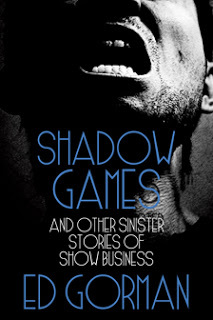
"There was one title that, day after day, caught my attention. It was a mass market paperback, black background with orange-red print and the large white Leisure Books logo—a publisher I miss badly—at the top of its spine. Its title, Shadow Games. When I finally relented and read Shadow Games, sitting right there in the library, its tale of Hollywood ambition, perversion, and lost potential, all told in a darkly humorous tone, made me a lifetime fan of Ed Gorman’s work."
Read more at Gravetapping!
Shadow Games and Other Sinister Stories of Show Business is available from Amazon and direct from the publisher, Short, Scary Tales.

Published on May 16, 2016 07:47
Ed Gorman's Blog
- Ed Gorman's profile
- 121 followers
Ed Gorman isn't a Goodreads Author
(yet),
but they
do have a blog,
so here are some recent posts imported from
their feed.



